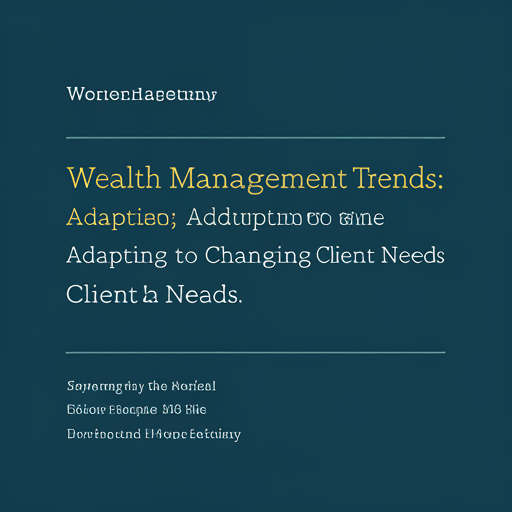Introduction to Wealth Management in the Cryptocurrency Era
The Evolution of Wealth Management
Wealth management has undergone significant transformation with the advent of cryptocurrency. This digital asset class has introduced new investment opportunities and complexities. Investors now seek diversified portfolios that include both traditional assets and cryptocurrencies. This shift reflects a broader trend towards embracing innovative financial instruments. Many are excited about these cjanges.
As clients become more tech-savvy, their expectations evolve. They demand personalized strategies that align with their financial goals. This is a crucial aspect of modern wealth management. Understanding client needs is paramount.
The integration of blockchain technology further enhances transparency and security in transactions. This innovation fosters trust between clients and advisors. Trust is essential in financial relationships. As the landscape continues to evolve, wealth managers must adapt to these changes. Adaptation is key to success in this dynamic environment.
Impact of Cryptocurrency on Traditional Wealth Management
The rise of cryptocurrency has significantly influenced traditional wealth management practices. Financial advisors now face the challenge of integrating digital assets into existing portfolios. This requires a nuanced understanding of both asset classes. Many advisors are adapting their strategies accordingly.
Key impacts include:
These factors necessitate a shift in investment strategies . Adapting to these changes is crucial. As the market matures, traditional wealth management must evolve. Evolution is vital for sustained growth.
Understanding Client Needs in a Digital Age
Shifts in Client Demographics
Client demographics are shifting dramatically in the digital age. Younger investors, particularly millennials and Gen Z, are increasingly entering the market. They prioritize technology and seek innovative investment solutions. This trend is reshaping wealth management strategies.
Key characteristics of this demographic include:
Understanding these needs is essential for advisors. Adapting to these preferences is crucial. Engaging with clients through digital channels is necessary. This engagement fosters stronger relationships.
Changing Investment Preferences and Risk Tolerance
Investment preferences are evolving rapidly among clients. Many are gravitating towards alternative assets, including cryptocurrencies. This shift reflects a desire for higher returns. Clients are also more open to risk.
Key trends include:
Understanding these preferences is vital for advisors. Adapting strategies to align with client goals is necessary. This alignment builds trust and satisfaction. Trust is the foundation of successful relationships.
Integrating Cryptocurrency into Wealth Management Strategies
Asset Allocation and Diversification
Effective asset allocation is crucial in wealth management. Integrating cryptocurrency can enhance diversification strategies. This approach mitigates risks associated with traditional assets. Many investors are exploring this option.
Key considerations include:
Advisors must tailor strategies to individual client needs. Customization fosters better investment outcomes. This alignment can lead to increased client satisfaction. Satisfaction is key to long-term relationships.
Tax Implications and Regulatory Considerations
Integrating cryptocurrency into wealth management requires careful consideration of tax implications. Cryptocurrencies are often treated as property for tax purposes. This classification can lead to capital gains taxes upon sale. Advisors must ensure clients understand these obligations. Awareness is crucial for compliance.
Additionally, regulatory frameworks are evolving rapidly. Advisors should stay informed about changes in legislation. This knowledge helps mitigate potential legal risks.
Key factors to consider include:
Understanding these elements is vital for effective planning. Effective planning leads to better financial outcomes.
Technological Innovations Shaping Wealth Management
Blockchain Technology and Its Applications
Blockchain technology is revolutionizing wealth management. Its decentralized nature enhances security and transparency. This innovation allows for real-time transaction processing. Speed is crucial in financial markets.
Moreover, smart contracts automate various processes. They reduce the need for intermediaries. This efficiency can lower costs significantly. Lower costs benefit clients directly.
Key applications include:
Understanding these applications is essential for advisors. Advisors must stay ahead of technological trends. Staying informed fosters better client relationships. Strong relationships lead to trust.
Robo-Advisors and AI in Cryptocurrency Investment
Robo-advisors and AI are transforming cryptocurrency investment strategies. These technologies provide automated portfolio management tailored to individual preferences. Automation enhances efficiency and reduces human error. Efficiency is essential in fast-paced markets.
Additionally, AI algorithms analyze vast amounts of data. This analysis helps identify trends and opportunities. Identifying trends is crucial for informed decision-making.
Key benefits include:
Understanding these innovations is vital for advisors. Advisors must embrace technology for competitive advantage. Embracing technology fosters client trust and satisfaction. Trust is fundamental in financial relationships.
Building Trust and Transparency with Clients
Educating Clients on Cryptocurrency Risks and Rewards
Educating clients about cryptocurrency is essential for informed investing. Understanding both risks and rewards fosters better decision-making. Clients must be aware of market volatility. Volatility can lead to significant losses.
Additionally, advisors should explain regulatory challenges. Compliance is crucial in this evolving landscape.
Key educational components include:
Building trust requires transparency in communication. Clear explanations enhance client confidence. Confidence is vital for lasting relationships.
Establishing Clear Communication Channels
Establishing clear communication channels is vital for effective client relationships. Regular updates on market conditions and investment performance build confidence. Clients appreciate transparency in all interactions. Transparency fosters trust over time.
Key strategies include:
These methods ensure clients feel informed and valued. Feeling valued enhances loyalty. Advisors should encourage feedback to improve communication. Feedback is crucial for growth.
The Future of Wealth Management in a Crypto-Driven World
Emerging Trends and Predictions
Emerging trends indicate a significant shift in wealth management practices. The integration of cryptocurrency into traditional portfolios is becoming more common. This evolution reflects changing client preferences and technological advancements. Many investors are seeking innovative solutions.
Key predictions include:
Advisors must adapt to these trends . Adapting is essential for future success. Staying informed will benefit both clients and advisors. Knowledge is power in finance.
Preparing for the Next Generation of Investors
Preparing for the next generation of investors requires a proactive approach. Younger investors prioritize technology and sustainability in their portfolios. This demographic is more likely to embrace cryptocurrency and alternative assets. Understanding their preferences is essential for advisors.
Key strategies include:
Advisors must adapt their communication styles. Adapting builds trust and loyalty. Staying ahead of trends is vital for success. Success requires continuous learning and adaptation.
